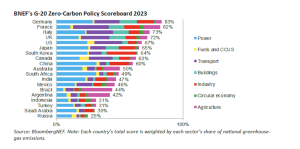Countries have implemented more and better policies to promote decarbonization since
the global energy crisis hit: BloombergNEF
London and New York, May 17, 2023 – The global energy crisis has prompted governments to take unprecedented steps to bolster energy security and affordability — but not at the expense of addressing climate change. On balance, most G-20 countries actually enhanced their low-carbon policy regimes in 2022, research group BloombergNEF (BNEF) finds in a new report.
The majority of government measures implemented since energy prices began to spike should not impede the transition to a lower-carbon economy. In fact, many should have the opposite effect by promoting energy efficiency or setting targets to replace fossil-fuel imports with renewables or nuclear power. In addition, most G-20 countries have implemented new support for low-carbon technologies and systems in the last year.
As a result, 17 nations maintained or improved their scores in the third edition of BNEF’s G-20 Zero-Carbon Policy Scoreboard – an annual report evaluating and ranking governments’ low-carbon policy regimes. Overall, the G-20 countries achieved an average score of 54% – up to two points on the 2022 assessment.
In light of last year’s challenges in particular, the results represent a net positive. Still, the report for the third year in a row underlined how far the world’s largest economies still are from implementing policies to address climate change comprehensively.
Victoria Cuming, head of global policy at BNEF said, “It’s good news that the energy crisis hasn’t resulted in widespread backtracking on climate policy. But this isn’t a reason to take a vacation: no G-20 country has enough low-carbon policy to achieve the goals of the Paris Agreement.”

The Scoreboard analyzes how the G-20 nations pursue decarbonization policies for seven sectors: power, transport, buildings, industry, agriculture, the circular economy, and fuels & carbon capture, use and storage. The G-20 nations account for some 80% of global greenhouse-gas emissions.
Overall, developed countries scored better on average for their low-carbon policies: G-20 countries in the OECD had an average score of 64% in this year’s assessment compared with 36% for non-OECD nations. This is concerning because the gap between the two groups expanded another two percentage points relative to the 2022 report. In addition, the non-OECD group includes large emerging economies with a rapidly growing carbon footprint.
Many governments have prioritized decarbonizing their electric power sectors. As a result, the G-20 averaged a 61% for this sector in 2023 – 1.3 points above the 2022 report. The nearest contender, transport, averaged 54%.
G-20 policymakers are starting to pay closer attention to harder-to-abate sectors. As a result, the average score for buildings, circular economy and industry rose 1.7-2.7 percentage points compared with last year. Nonetheless, more policy support is needed especially outside power and transport, as these sectors average 47%. In particular, policymakers could implement concrete financial incentives for clean hydrogen, CCUS and sustainable agricultural practices, tougher energy-efficiency standards for buildings and rules on waste, and carbon pricing.
The EU member states and the UK top this year’s G-20 Scoreboard. France came close to taking the overall crown thanks to a strong performance across the board, especially in buildings and industry. But with its own improvements in those two sectors, Germany retained the top spot again. Italy shot up to third, leaving the UK in fourth.
The US achieved by far the biggest increase in score, climbing four places to fifth thanks in large part to the Inflation Reduction Act. The US has still not cracked the top four because European nations have implemented more “policy sticks”, including carbon pricing, coal-power bans and tough standards on energy efficiency. These are meant to force decarbonization and thus gain more points under the Scoreboard methodology, while financial and fiscal support can only incentivize change.
The BNEF Policy Scoreboard scored each G-20 member out of 100% based on the volume of government support implemented to cut GHG emissions, the robustness of these programs and the policy-making process, and metrics to gauge whether they are starting to drive change on the ground. A comprehensive executive summary of the report can be found here. BNEF clients can read the full report at BNEF.com. The 2023 G-20 President is India. Click here to engage with BNEF’s annual summit in India, to be held August 24th in New Delhi.
Contact
Oktavia Catsaros
BloombergNEF
+1-212-617-9209
ocatsaros@bloomberg.net
About Bloomberg
Bloomberg is a global leader in business and financial information, delivering trusted data, news, and insights that bring transparency, efficiency, and fairness to markets. The company helps connect influential communities across the global financial ecosystem via reliable technology solutions that enable our customers to make more informed decisions and foster better collaboration. For more information, visit Bloomberg.com/company or request a demo.